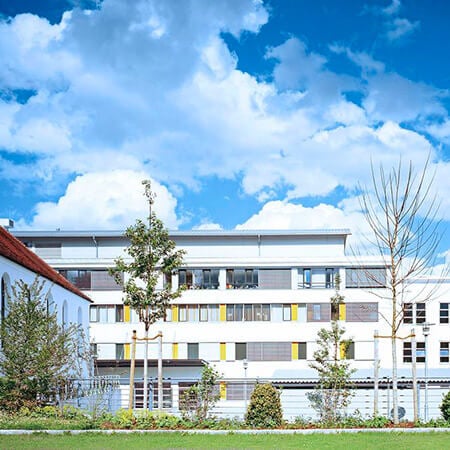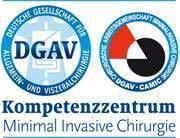Enterocele is a pelvic hernia containing small bowel loops. It is a protrusion of the peritoneum between the rectum and the vagina. The pathology often develops after childbirth due to the damage to the pelvic fascia, muscles and nerves. After the fourth childbirth, the risk of enterocele increases 12 times. The pathology often develops after surgical interventions on the pelvic organs, most often after a hysterectomy (removal of the uterus). To treat the disease, doctors abroad perform minimally invasive operations: laparoscopic and robot-assisted ones.
Content
- Types of enterocele
- Symptoms
- Enterocele diagnostics
- Treatment
- Where to undergo treatment
Types of enterocele
According to the origin of enterocele, there are different types of this pathology:
- Congenital – occurs due to incomplete fusion of the rectovaginal septum.
- Traction – pressure of the cervix or uterine stump occurs when the support of the pelvic floor is impaired.
- Pulsion – occurs due to a periodic increase in pressure in the abdominal cavity (cough, constipation).
- Iatrogenic – develops after operations, as a result of which the axis of the vagina becomes vertical.
The following grades of the disease can be determined with X-ray imaging:
- Grade 1 – location of the enterocele above the pubococcygeal line.
- Grade 2 – below the line.
- Grade 3– below the ischiococcygeal line.
The following grades of the disease can be determined with MRI scanning:
- Grade 1 – hernia is up to 3 cm.
- Grade 2 – up to 6 cm.
- Grade 3 – more than 6 cm.
Enterocele can be simple or complex. The complex one is combined with other types of pelvic organ prolapse. It is more common.
Symptoms
Symptoms differ depending on the size of the enterocele. When the size is up to 3 cm, there are no symptoms. As the hernia grows, the following complaints appear:
- Pain in the perineum and vagina.
- Feeling of pressure, foreign body.
- Bladder dysfunction.
- Pain during a sexual intercourse.
Symptoms are worse during the day and are better after resting in a horizontal position.
Anal sphincter dysfunction may develop. More often it is constipation, less often patients suffer from fecal incontinence. Constipation develops in 5% of women. It develops when the enterocele is more than 6 cm.
Enterocele diagnostics
In theory, the enterocele should be diagnosed only with the presence of small bowel loops in the hernia sac. However, it may contain other content as well:
- Sigmoidocele – sigmoid colon.
- Omentocele – omentum.
- Peritoneocele – there are no organs in the bag, but only the protrusion of the tendon center of the perineum occurs.
In practice, it can be quite difficult to determine what exactly is contained in the hernial sac prior to the operation. Doctors find only a rectal bulge into the back wall of the vagina. Therefore, all patients with the listed pathologies receive one diagnosis: enterocele.
Pelvic floor prolapse is a complex and multifactorial process, and therefore isolated small bowel prolapse is very rare in the practice of a surgeon. As a rule, prolapse of the uterus, bladder, perineum, vagina or vaginal fornix is detected at the same time after hysterectomy (removal of the uterus).
MRI is of crucial importance in diagnostics. With clinical methods, enterocele can be detected only in half of the women. The specialists in Europe carry out dynamic MRI, as it helps to assess the function of the pelvic floor organs.
With poor technical capabilities, perineal dynamic ultrasound becomes an option of choice. Doctors monitor the movement of the pelvic floor while straining the patient and squeezing the perineum. Doctors abroad can use 3D echodefecography with the simultaneous insertion of a sensor into the rectum and vagina.
Treatment
The main non-surgical treatment for vaginal enterocele, like for other types of pelvic organ prolapse, is pessary implantation. It can be successfully implanted in all women. However, the procedure has a drawback: the results deteriorate over time. As a result, only half or even a third of women are not satisfied with the treatment results.
Here are some additional non-surgical methods to reduce prolapse:
- Smoking cessation.
- Pelvic floor muscle training.
- Losing weight.
- Treatment of chronic diseases.
If conservative therapy does not help, the specialists resort to a surgical intervention. The doctor's task is to detect and eliminate the enterocele, remove the hernial sac, bandage its neck and close the defect, thereby restoring the normal axis of the vagina.
The surgical intervention can be performed with the use of different surgical access: vaginal, classic abdominal (a large incision on the abdomen) and laparoscopic. Hospitals abroad give preference to minimally invasive interventions, since patients can recover quickly after them. The most frequent access is the vaginal one. This is due to the fact that with this access the specialists can repair the concomitant manifestations of prolapse: rectocele, cystocele, vaginal vault prolapse, urinary incontinence. When performing the operation, a surgeon fixes the vaginal walls to stable anatomical structures: the sacrospinous ligament, the iliococcygeus muscle and the pelvic fascia. Mesh endoprostheses can sometimes be used for better fixation of organs.
Laparoscopic surgical interventions are performed through small incisions in the abdomen. One of the most popular is sacrocolpopexy. The doctor fixes two thirds of the vagina to the anterior longitudinal ligament of the sacrum with a mesh prosthesis. Laparoscopic pectopexy is used less commonly: for the elimination of prolapse, the prolapsed organs are fixed with a mesh to the Cooper's ligament on both sides.
Where to undergo treatment
To benefit from the highest level of medical care, you can undergo surgical treatment of enterocele abroad. The specialists of the Booking Health company will select for you the best hospitals for the treatment of enterocele abroad and take care of the organization of your trip.
There are several reasons for you to undergo treatment of enterocele and pelvic organ prolapse abroad:
- The possibility to undergo a simultaneous correction of enterocele, rectocele, cystocele, and urinary incontinence.
- The use of laparoscopic and robot-assisted surgical interventions, as they are less traumatic and safer.
- Preservation of both sexual and reproductive function.
- With isolated enterocele, the risk of disease recurrence after surgery is close to zero.
- Low risk of complications: incontinence or urinary retention, vaginal shortening, intestinal and vaginal fistulas.
- High-quality postoperative care and recovery.
Please leave your request on the Booking Health website. Our specialist will contact you within just a few hours. If you book a medical care program via our service, the cost of the operation will be lower due to the lack of additional coefficients for foreign patients. You can compare the cost of treatment in different hospitals in order to book your treatment at the best price.
Authors: Dr. Nadezhda Ivanisova, Dr. Sergey Pashchenko




















